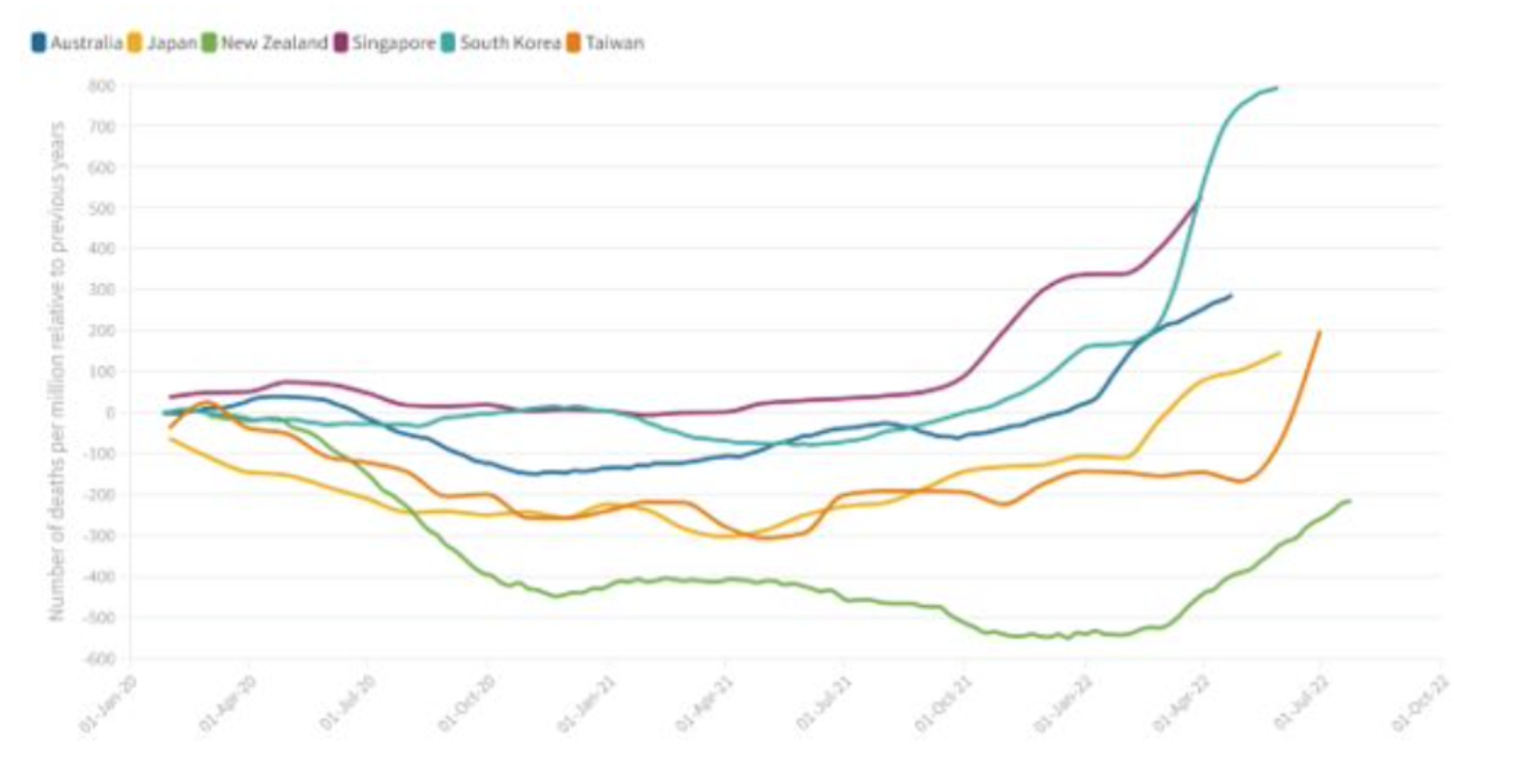Table of Contents
Guy Hatchard
hatchardreport.com
Dr Guy Hatchard is an international advocate of food safety and natural medicine. He received his undergraduate degree in Logic and Theoretical Physics from the University of Sussex and his PhD in Psychology from Maharishi University of Management, Fairfield Iowa.
Information
Opinion
How A Small Scientific Elite Dictates Government Policy.
The University of Otago publishes a blog called Public Health Expert. The 24th August edition was entitled “The Covid-19 experience in Aotearoa New Zealand and other comparable high-income jurisdictions and implications for managing the next pandemic phase.”
The authors were Dr Jennifer Summers, Prof Nick Wilson, Dr Lucy Telfar Barnard, Dr Julie Bennett, Dr Amanda Kvalsvig [and] Prof Michael Baker who all work at the Otago University Department of Public Health.
This blog has been picked up uncritically by newspapers across New Zealand. For example the Otago Daily Times claims that:
“A new analysis has shown how New Zealand’s pandemic response left it with one of the lowest rates of excess mortality in the world – sparing it the thousands of extra deaths seen even in elimination countries like Taiwan and Australia.”
The blog uses data from Our World in Data, a US website, in order to compare New Zealand data with Taiwan, Singapore, Japan, Australia and South Korea. Based on their analysis the authors of the blog advise extending NZ pandemic policy including vaccine enforcement, mask wearing, home isolation, and vaccines for the under fives.
The blog prints a graph (below) apparently showing that New Zealand has the lowest rate of excess all-cause deaths among the six countries for the years 2020, 2021 and 2022 (the small print notes that the graph might not count all deaths due to incomplete coverage and delays in reporting).

How A Small Scientific Elite Dictates Government Policy.
The graph appears to show that all cause deaths in New Zealand have remained well below pre-pandemic levels throughout the three years covered by the pandemic. The Y axis is labeled ‘number of deaths per million relative to previous years’. The graph does not state whether this is a weekly total or a cumulative total or something else.
A naive reading of the graph, which was presumably the approach of the various poorly qualified science explainers in MSM, appears to show that excess deaths per million are currently at a rate of 200 deaths below previous levels (per week, per year, per three years??? the blog doesn’t tell you), but you would be completely wrong to read the graph like this.
If you go vertically up from the date 1 July 2022 to the graph and then across to the Y axis, as we are trained to do in school, you reach a figure – minus 250. If you think that means in the week ending 1st of July all-cause deaths were 250 below the long term average, you are being misled. The all-cause death rate for the most recent week of August is actually 246 ABOVE the long-term average.
Close inspection shows that the graph is a measure of the accumulating excess death rate for the entire pandemic, not the current death rate. In other words the early death data before Covid infection and vaccines is averaged with present data which appears to lower the current death rate.
The success claimed for New Zealand by the blog and the low death rate reported by MSM is actually due to the extreme lockdown measures of 2020 and the consequent zero flu rate. Since then, matters have consistently deteriorated and now deaths are accelerating to unprecedented high levels.
In 2020 there were virtually no Covid infections and no vaccines. The closure of borders and lockdowns ensured there was no flu season. All-cause deaths were very low. For most of 2021 lockdowns continued and Covid cases were very low, vaccines were rolled out. Deaths rose and peaked parallel to the vaccine uptake. In 2022 all-cause deaths have risen dramatically. Deaths because of Covid form a very small percentage of the all-cause deaths.
Official New Zealand Ministry of Health figures from last week show that all-cause deaths were 946 for the week. This is a record for New Zealand. The pre-pandemic average number of deaths per week was 663. Taking into account seasonal fluctuations (winter deaths are higher) the current excess number of weekly all cause deaths is 35 per cent above the long-term average. A very worrying figure indeed. Among the highest in the world, not the lowest.
The correct interpretation of the 2022 figures in the graph is as follows:
How A Small Scientific Elite Dictates Government Policy.
All six countries which have followed vaccination policies very similar to New Zealand now have rapidly rising all-cause death rates.
Are you impressed or are you disappointed with the rather deceptive approach being taken by Otago scientists? If you are concerned you are not alone, in fact you are in august company. Rishi Sunak, until recently UK Chancellor of the Exchequer, currently in the last weeks of his bid for the Tory leadership, has given an interview with Spectator magazine entitled:
“The lockdown files: Rishi Sunak on what we weren’t told.”
These are some of his conclusions he reached from inside the UK government decision-making process:
“When the evidence started to roll in, a strange silence grew in government: dissenting voices were filtered out and a see-no-evil policy was applied.”
“A cost-benefit calculation – a basic requirement for pretty much every public health intervention – was never made… The script was not to ever acknowledge side effects [of policies].”
One of Sunak’s big concerns was about the fear messaging, which his Treasury team worried could have long-lasting effects.
“In every brief, we tried to say: let’s stop the “fear” narrative. It was always wrong from the beginning. I constantly said it was wrong.”
The UK Prime Minister Boris Johnson wanted to present it as ‘following the science’ rather than a political decision, and this had implications for the wiring of government decision-making. It meant elevating Sage, a sprawling group of scientific advisers, into a committee that had the power to decide whether the country would lock down or not, but it was a forum where questions could not be asked. Sunak said:
“This is the problem, if you empower all these independent people [advisors], you’re screwed.”
Sunak said that questions and concerns raised by some Sage scientists during their private meetings were withheld from government. As a result, according to Sunak, government pandemic policies, especially lockdowns, created an economic disaster.
This week’s Public Health blog from the University of Otago is a prime example of what Rishi Sunak has revealed. The blog is aimed directly at informing future government policy. It says:
“Based on a comparison of responses we provide updated recommendations for the NZ Government around strengthening existing public health measures to reduce the immediate and long-term impacts from Covid-19.”
In fact, the information provided by the Otago Department of Public Health scientists to the government in this blog is lacking key explanatory information and apparently biased in favour of particular policy decisions. It suggests that prior NZ policy has been the best in the world and should be extended.
Their recommendations include:
• Extending current government messaging encouraging boosters
• Strengthening measures in schools
• mRNA vaccines for the under fives
• Deploying new biotech vaccine types
• Stronger measures to ensure vaccine acceptance
• Mandates to enforce mask wearing
• Longer periods of home isolation
The sole reference in the blog to the rapidly accelerating all-time record levels of all-cause mortality in New Zealand is this phrase:
“… the direction of the curve suggests that the reduction is decreasing in magnitude.”
Do you think that is sufficient information for politicians to make informed policy decisions? We don’t. As Benjamin Franklin said many years ago:
“There’s none deceived but he that trusts.”
As I wrote to Prime Minister Ardern last week, we are not recording the vaccination status of people on death certificates. As a result, we don’t know what is causing the excess deaths in New Zealand. In the UK, such figures are kept and they show that excess deaths are disproportionately affecting the vaccinated, especially the boosted. Data from other countries indicates the causes might include high cancer rates, blood clots and cardiovascular illness. Crucially, deaths rates are unusually affecting working age people and the young. Have our experts informed our government? Apparently not.
As Rishi Sunak advises: “Find out what you are not being told.”









